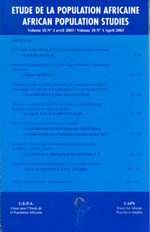
|
African Population Studies
Union for African Population Studies
ISSN: 0850-5780
Vol. 12, No. 1, 1997
|
 Bioline Code: ep97004
Bioline Code: ep97004
Full paper language: English
Document type: Research Article
Document available free of charge
|
|
|
African Population Studies, Vol. 12, No. 1, 1997
| en |
Sexual Behavioural Factors Predisposing "Street-involved" Youth in Accra to HIV/AIDS Infection
Anarfi, John K. & Appiah, B.N.
Abstract
The study covered 250 respondents from ages 10 to 24 and comprised 175 males and 75 females. The source of data was a survey conducted in 1992 on the out-of-school youth in Accra and risk-taking behaviour. The survey instrument was a structured questionnaire with focus group discussion as supplement. The respondents were of very low socio-economic status that cut across education, occupation and residential background and had probably resulted from similar low level education of parents and loose family bonds. The combined effect of these appeared to have forced the respondents to take up early responsibility for their own lives in occupations and environment that reinforced and sustained a condition of sexual vulnerability among the youth. This was further to be aggravated by the respondents' forward motivated sexual perception which eventually manifested in a state of rampant and unprotected sexual relations. Risk reduction was virtually non-existent because STDs/AIDS were perceived to be diseases of commercial sex workers. Implications of the findings call for intervention efforts both specific to the group and the general population. However, in addition to AIDS campaign efforts, solutions to adverse social and economic conditions that predispose the youth to high-risk environment and risk-taking sexual behaviour are called for in the long term.
|
| |
| fr |
Anarfi, John K. & Appiah, B.N.
Résumé
Une étude a été menée en 1992 sur le comportement sexuel risqué des jeunes ayant abandonné l'école à Accra. les personnes intérrogées ont un statut socio-économique très bas qui provient probablement d'un faible niveau de l'origine socio-économique des parents et généralement de liens familiaux lâches. L'effet conjugué de ces facteurs semble avoir contribué à la vulnérabilité sexuelle des jeunes. Cela devait être aggravé davantage par la motivation sexuelle précoce des personnes interrogées qui s'est finalement manifestée par le caractère généralisé et non protégé des rapports sexuels. La réduction du risque était pratiquement inexistante parce que les MST/SIDA étaient perçus comme des maladies propres à ceux qui s'adonnent au commerce du sexe. Ces conclusions appellent des efforts d'intervention spécifiques au groupe et à la population globale. Outre les efforts déployés dans le cadre de la campagne anti-Sida, il est nécessaire d'aborder les conditions sociales et économiques défavorables qui prédisposent la jeunesse à un environnement à haut risque et à un comportement sexuel risqué.
|
| |
© Copyright 1997 - Union for African Population Studies
Alternative site location: http://www.uaps-uepa.org
|
|
